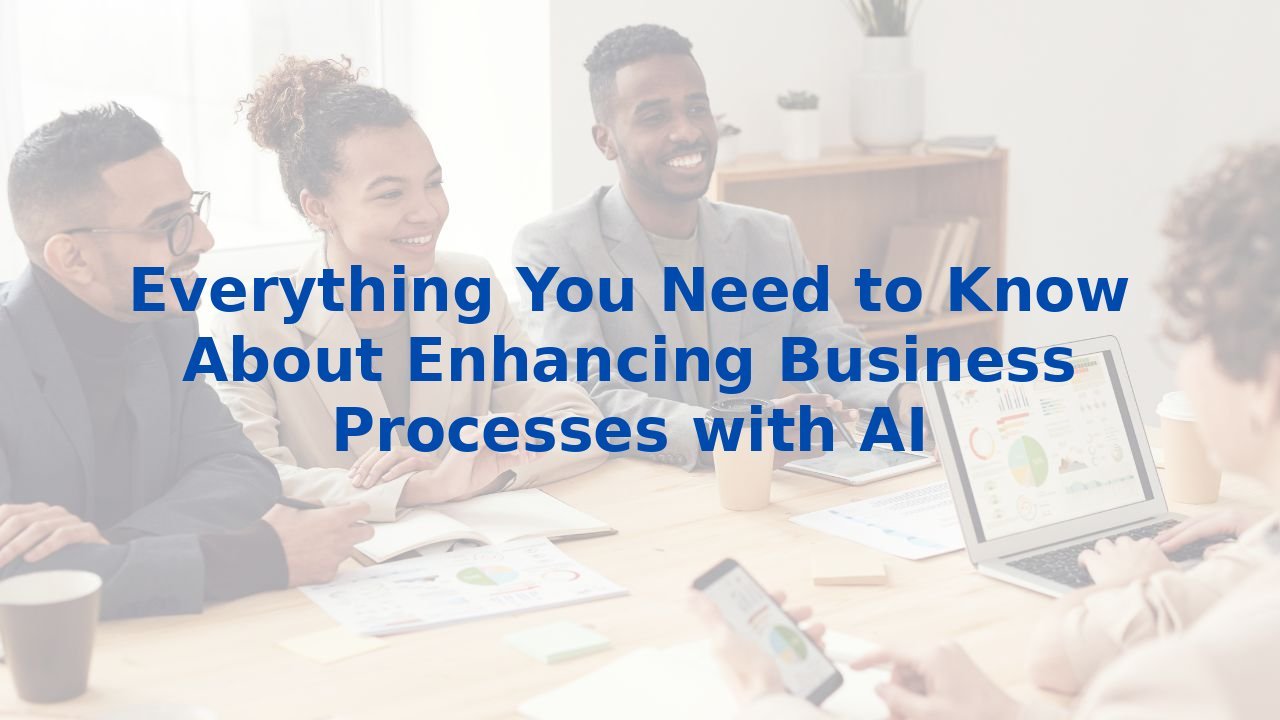Everything You Need To Know About Enhancing Business Processes with AI
Enhancing Business Processes with AI: A Comprehensive Guide
In the fast-evolving landscape of today’s business world, organizations are leveraging Artificial Intelligence (AI) as a powerful catalyst for transformation. Whether it’s streamlining operations, elevating efficiency, or fostering innovation, AI is paving the way to more intelligent business practices. This discussion uncovers the essential business processes ripe for AI enhancement, spotlighting the significant efficiency gains organizations can achieve by integrating this technology. Equally, we’ll highlight why empowering your workforce with AI training is not just beneficial, but necessary.
1. Data-Driven Decision Making
One of AI's standout capabilities is its proficiency in processing vast amounts of data swiftly and accurately. This feature empowers organizations to engage in informed, data-driven decision-making—an essential advantage in a world where knowledge truly is power. In fields like marketing and supply chain management, AI analyzes consumer behavior trends, providing insights that lead to targeted marketing campaigns. This ensures that products and services resonate with customer needs, ultimately driving sales and customer satisfaction.
2. Automation of Repetitive Tasks
Imagine freeing your team from mundane tasks to focus on creativity and strategy. AI makes this possible by automating repetitive processes traditionally handled by humans. Take customer service, for example, where AI-powered chatbots manage routine inquiries, enabling human agents to concentrate on more complex challenges. Additionally, automation extends to administrative duties—think scheduling and data entry—transforming organizational efficiency and allowing employees to contribute more strategically.
3. Improved Operational Efficiency
AI has the remarkable capability to optimize operations and reduce costs across industries. In manufacturing, AI streamlines production schedules and resource management, minimizing waste and maximizing output. Coupled with predictive maintenance, AI anticipates equipment failures, dramatically reducing costly downtimes. Businesses that embrace these advancements can expect not just improved efficiency but a more agile and responsive operational framework.
4. Enhanced Customer Experience
The importance of delivering a tailored customer experience cannot be overstated. AI facilitates this by analyzing customer data to generate personalized recommendations, which leads to deeper engagement and increased loyalty. By understanding and predicting customer needs, organizations can ensure their offerings are aptly aligned, fostering long-lasting relationships and customer retention.
5. Innovation and Product Development
Innovation is key to staying relevant, and generative AI is emerging as a game-changer in this domain. Particularly in industries like pharmaceuticals, AI accelerates research and development, assisting in the creation of new products and anticipating their effectiveness. This combination of speed and quality enhancement is revolutionary—paving the way for breakthroughs that can change markets and customer experiences.
6. Risk Management and Cybersecurity
In a world rife with uncertainties, proactive risk management has become indispensable. AI shines in this arena by identifying and mitigating potential risks swiftly. In cybersecurity, it helps detect anomalies that may indicate a breach, enabling organizations to safeguard their data. Similarly, in financial sectors, AI tools assist in discerning risks and uncovering opportunities, ensuring strategic decision-making that places organizations on the path to resilience.
The Importance of Training Employees for AI
While the advantages of AI are clear, its effectiveness hinges on how well employees can utilize it. Training programs focused on AI integration are vital for several reasons:
- Skill Development: Equipping employees with AI skills ensures they can harness these tools to their fullest potential, allowing them to transition from routine tasks to higher-value work.
- Adaptability: The realm of AI is rapidly evolving; training encourages adaptability and keeps employees updated with innovations that can enhance their effectiveness.
- Employee Engagement: Knowledge breeds engagement. Trained employees are generally more engaged and productive, possessing the confidence to drive organizational success.
Conclusion
AI is not just a technological asset; it is a transformative force redefining how businesses operate. From refining decision-making processes to revolutionizing customer experience, the potential for growth and efficiency is enormous. Moreover, investing in employee training is crucial to unlocking the full benefits of AI, ensuring that your workforce is both skilled and adaptable.
By weaving AI into the fabric of your operations and prioritizing employee competency through comprehensive training, your organization can leap toward unprecedented efficiency and effectiveness. The future of business processes is intelligent—are you ready to embrace it?



